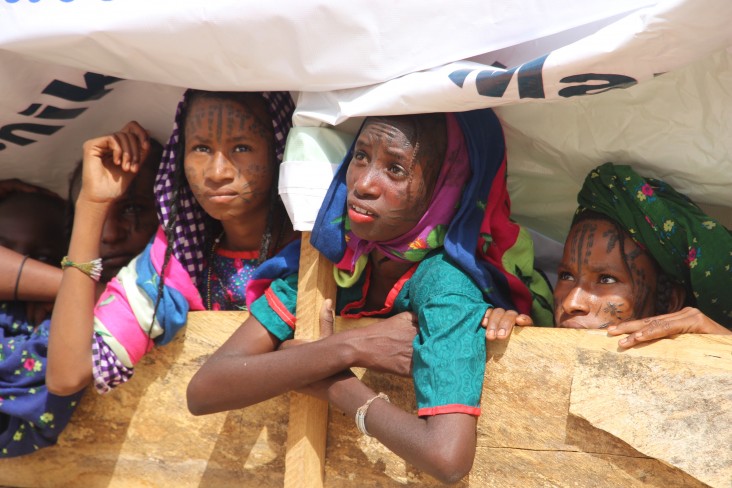Speeches Shim

May 2018 — The Boko Haram insurgency in northeastern Nigeria has created a culture of fear and distrust among religious groups in Michika, a local government area in Adamawa state. This distrust is prominently seen among Muslim and Christian groups who blame each other for the insurgency.
The feud between both groups became so intense that local government officials assigned separate market days at the community’s largest market, Michika Central Market, to avoid conflict.
But for the first time since the Boko Haram insurgency divided the community, dance and drama performances at the central market have drawn a common audience of both Muslims and Christians. USAID’s Office of Transition Initiatives supported the Michika local government council to host monthly cultural theater activities imbued with peace and reconciliation messaging in the market to help increase community cohesion and foster a sense of reconciliation in the local government area.
In the weeks leading up to the market performances, USAID helped the council to create a cultural troupe of 40 traditional dancers, musicians and actors from Adamawa state. The troupe developed performances highlighting the need for peace and the benefits of reconciliation. Shortly after, the troupe began intense rehearsals and worked to create buzz for their show by distributing fliers.
On Jan. 3, the cultural troupe held its first performance in the Michika Central Market. Hundreds of community members gathered to watch the troupe as they put on a play and performed cultural dances. The audience, from multiple religious and economic backgrounds, applauded and cheered. The first performance received such a positive reaction from the community that the troupe performed monthly for the next three months to a consistently growing audience of Muslim and Christian community members. The troupe put on a total of nine performances with estimated audiences of 1,500-2,000 people.
These performances were well-received due to their ability to highlight the greater cultural similarities between communities, rather than emphasizing their differences and the negative impacts that the insurgency has imposed on the community.
“Our culture, our heritage, is what we need to unite what we have all lost,” said Peter*, a community member. “We should not allow our enemies to utilize our differences to their advantage.”
Commending the use of theater as an instrument of peace and reconciliation, the head of the market said, “This activity in its entirety is what we need the most. We cannot hide our joy that someone can demonstrate the need for unity amongst us irrespective of tribe or religion. The atmosphere is electrified. Thanks to the local government for such initiatives.”
Patience, one of the troupe dancers, noted the joyful atmosphere during the performances. “I have been dancing for quite a long time now,” she said. “I can see Michika people love their culture. You can see the excitement.”
Today, the community is more united. The community theater has created a common platform for both groups to bond over shared interests and experiences, laying the foundation for greater teamwork, peacebuilding and collaboration within the local government area.
*Names, in part or full, have been omitted to protect security.
LINKS

Comment
Make a general inquiry or suggest an improvement.